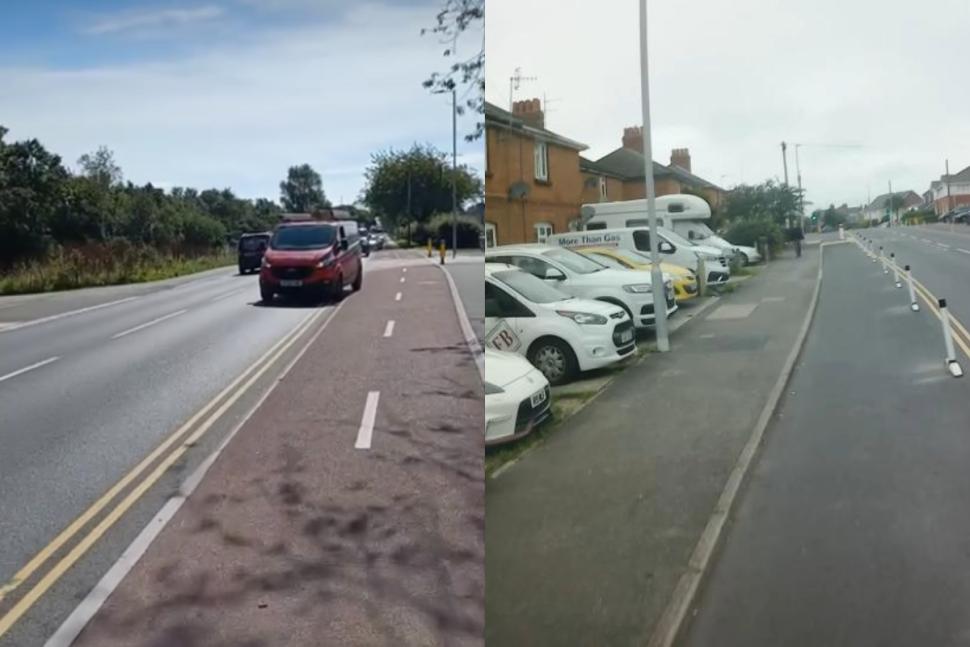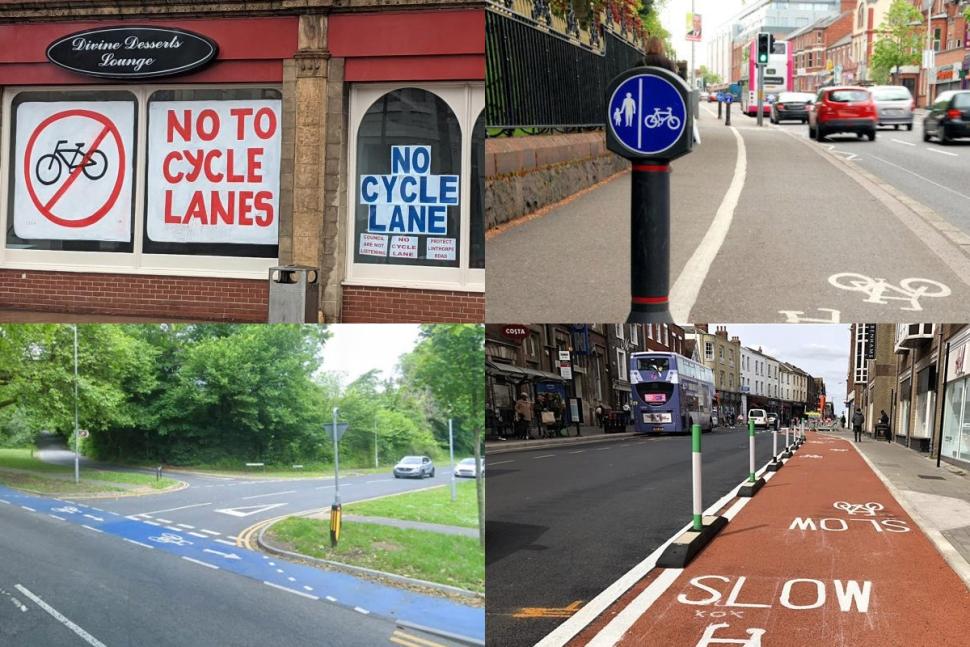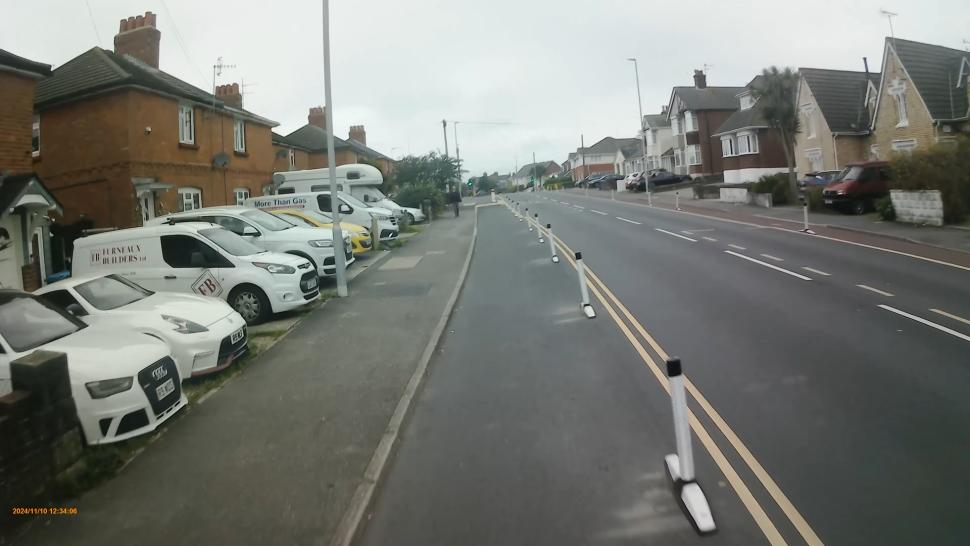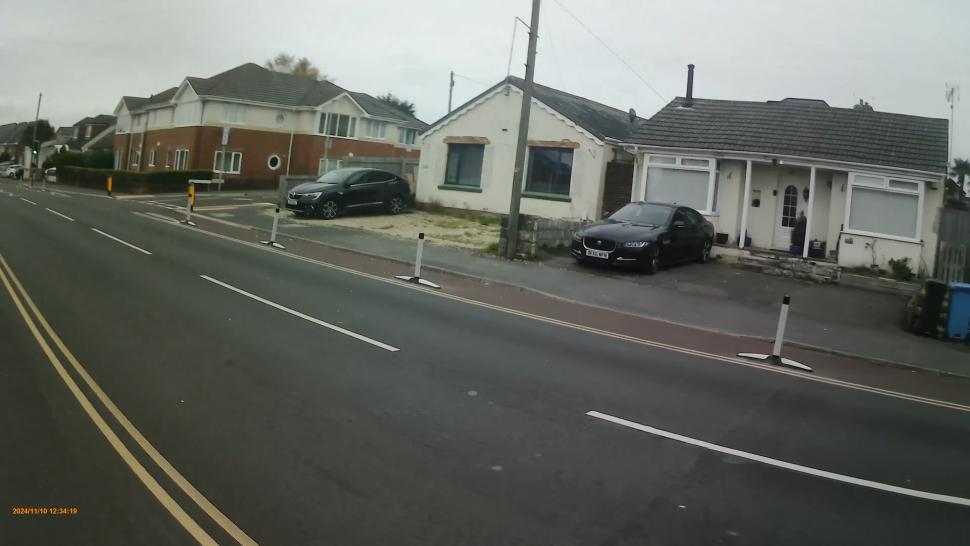- News
- Reviews
- Bikes
- Components
- Bar tape & grips
- Bottom brackets
- Brake & gear cables
- Brake & STI levers
- Brake pads & spares
- Brakes
- Cassettes & freewheels
- Chains
- Chainsets & chainrings
- Derailleurs - front
- Derailleurs - rear
- Forks
- Gear levers & shifters
- Groupsets
- Handlebars & extensions
- Headsets
- Hubs
- Inner tubes
- Pedals
- Quick releases & skewers
- Saddles
- Seatposts
- Stems
- Wheels
- Tyres
- Tubeless valves
- Accessories
- Accessories - misc
- Computer mounts
- Bags
- Bar ends
- Bike bags & cases
- Bottle cages
- Bottles
- Cameras
- Car racks
- Child seats
- Computers
- Glasses
- GPS units
- Helmets
- Lights - front
- Lights - rear
- Lights - sets
- Locks
- Mirrors
- Mudguards
- Racks
- Pumps & CO2 inflators
- Puncture kits
- Reflectives
- Smart watches
- Stands and racks
- Trailers
- Clothing
- Health, fitness and nutrition
- Tools and workshop
- Miscellaneous
- Buyers Guides
- Features
- Forum
- Recommends
- Podcast
news
 BCP cycle lane projects (Facebook/DorsetSaferRoads)
BCP cycle lane projects (Facebook/DorsetSaferRoads)"Not everyone has the option to drive": Council addresses backlash over controversial cycle lane projects, including row over 'driveway-blocking wands' and 'Britain's biggest bike lane'
As a section of residents in Dorset have backed a petition raising concerns about "excessive delay, disruption and inconvenience" caused by "the construction of extremely expensive and obviously under-utilised cycle paths", the council has responded by pointing out "not everyone in our community has the option to drive" and works are designed to benefit all road users, not just cyclists.
BCP Council (Bournemouth, Christchurch and Poole) has been at the forefront of the regularly seen disputes over active travel projects in the United Kingdom, residents outraged at what they see as expensive and under-used cycling infrastructure making their lives worse.
A petition calling for the Liberal Democrat and independent-run council to "reconsider their current local transport and infrastructure policies" has been launched online and has 971 signatures of its 1,000-signature target, Change.org saying that almost half of those came today after petition was given coverage in a MailOnline article titled: 'Our council is causing traffic chaos and spending £120m to install 50 MILES of cycle lanes - despite the ones already there barely being used'.
Discussion around cycle lanes is nothing new in the area, a cycle lane dubbed 'Britain's biggest bike lane' and controversial cycle lane wands that 'blocked' driveways in Poole have made headlines in recent years, certain sections of the community furious at the investment.
Steve Moody, who set up BCP and Dorset Motorists, started the petition and claimed residents and businesses are "suffering excessive delay, disruption and inconvenience caused by the poor planning and management of our local roads by BCP Council".
"The construction of extremely expensive and obviously under-utilised cycle paths, along with a huge numbers of local roadworks, all being carried out at the same time with minimal co-ordination by BCP Council are real and major issues," he claims. "As a result the quality of local residents lives are being severely and adversely impacted. Accessibility for the less mobile and elderly, who for them the car is their only option is also significantly reduced."
However, BCP Council has responded to the backlash and explained it is funding cycle lanes through investment from the government's Transforming Cities Fund. The local authority's cabinet member for roads, Andy Hadley, insisted the infrastructure projects benefit all road users, not just cyclists, and countered the petition's claims by pointing out, "Not everyone in our community has the option to drive."
"We know residents want well-maintained roads that allow everyone to get from A to B safely and without disruption," he said. "However, dealing with increasing traffic is a problem faced in urban areas across the planet, and not everyone in our community has the option to drive.
"We have been successful in securing external funding through government grants to modernise travel across Bournemouth, Christchurch and Poole. These works relate not only to cycle lanes, but also to changes to improve the links for pedestrians, bus-users, cyclists and motorists, including road drainage and environmental improvements.
"We know more needs to be done if we are to tackle the issues of congestion and air quality and we will continue to make the case to government for further investment."
However, BCP and Dorset Motorists founder Mr Moody argues: "The repercussions of these BCP policies fail to deliver the expectations and needs of our local community. It's not just about congested streets and increased drive times. It's not just about more carbon emissions rather than less, it's about how these BCP policies are impacting the safety, environment and overall quality of life in our region."
Curiously, he appears to recognise "existing policies are not mitigating transport issues" and need to be "re-evaluated" as "each year we are seeing an increase in road traffic in Bournemouth, Christchurch, and Poole (BCP) area compared to the national average". However, the conclusion given in the petition is that the active travel projects, designed to give people more choice and access active travel, are "critical decisions affecting thousands of motorists and residents appear to lack the inclusivity and transparency that's required".
"We feel our voices and concerns are ignored," the petition concludes. "Therefore, we call for the BCP council to re-evaluate current transport policies and provide a transparent, inclusive decision-making process and develop a partnership with all local road users not just those of active travel."
There has been no shortage of stories emerging from the county regarding rows over bike lanes and active travel projects.
Just last month, the seaside town of Poole made national newspaper headlines after upset locals claimed they had been "blocked" in their driveways by wands installed to segregate the route from traffic.
However, the council says it will create a safer environment for people using it, preventing drivers from blocking the bike lane with parked cars, and others from the town have questioned the "overblown" outrage.
There has also been criticism of a cycle lane in Wimborne that was dubbed 'Britain's biggest bike lane' by the Daily Mail due to its nine-and-a-half-feet width. In May, some locals called for more space to be re-allocated to drivers, as "that's the majority", while the project also attracted the usual "waste of money" calls.
This summer, business owners near a new cycle lane in Ferndown blamed its appearance for their struggles, although several negative online reviews for "dreadful" food at one fish and chip shop that closed suggested roadworks might not be the sole consideration if dwindling trade is the issue.
2024 also saw motorists threaten to launch a legal challenge after councillors voted to prevent rat-running through Poole Park near Sandbanks, one of the wealthiest neighbourhoods in the country. The local council says the closure will "enable more people to enjoy relaxing, walking, wheeling, running, or cycling".
Dan is the road.cc news editor and joined in 2020 having previously written about nearly every other sport under the sun for the Express, and the weird and wonderful world of non-league football for The Non-League Paper. Dan has been at road.cc for four years and mainly writes news and tech articles as well as the occasional feature. He has hopefully kept you entertained on the live blog too.
Never fast enough to take things on the bike too seriously, when he's not working you'll find him exploring the south of England by two wheels at a leisurely weekend pace, or enjoying his favourite Scottish roads when visiting family. Sometimes he'll even load up the bags and ride up the whole way, he's a bit strange like that.
Latest Comments
- IanGlasgow 2 sec ago
"near his home in Monaco" Yet another cyclist who doesn't pay any tax
- Rendel Harris 29 min 38 sec ago
But we could have ANPR cameras automatically issuing sanctions to vehicles over a certain width who ignore posted restrictions, no physical...
- Tom_77 1 hour 49 min ago
The SaddlePod looks nice, but if you're in the UK by the time you've paid shipping ($31) and import duty (who knows where we'll be with that come...
- TheBillder 1 hour 52 min ago
I've had (past tense is deliberate) 3 of these over the past 5 years. I'm back here researching for a replacement as my last one broke last week. I...
- chrisonabike 3 hours 54 min ago
And the next time - plead sympathy for your addiction, caused by trauma from your previous "accident"...
- wtjs 3 hours 57 min ago
Butyric Acid... was the most disgusting thing I have ever smelt in the lab...
- ubercurmudgeon 4 hours 28 min ago
Even a stopped clock, etc, etc...
- Bigtwin 5 hours 49 min ago
I wouldn't be meeting that Orange Pillock anywhere, let alone 1/2 way.



Add new comment
22 comments
Cyclists wouldn't need cycling infrastructure if drivers adhered to the highway code and drove within the speed limits, drivers moan like little babies, but it's their own fault, idiots
The cyclists of today would appreciate this, but they make up a few % of those making journeys. And I only appreciate traffic lights because other motorists (roundabouts are also something I could do without on a bike).
For all those not cycling currently, or those who only cycle around the local park - they want both competent drivers AND (all kinds of) infra. In fact, on "streets" motor traffic volume and speed reduction might be the most urgent. But without infra changes it's very hard to do either of those. (And doing so naturally connects with a desire for alternatives on the main roads, which will need the more well known "cycle paths" etc.)
"the construction of extremely expensive and obviously under-utilised cycle paths"
The wailing and gnashing of teeth will be deafening when he finds out how much pointless road schemes cost.
reminds me .....
I'm in that BCP Facebook group, because I'm an occasional visitor and to see what is being said.
1.2k members, some people arguing both sides of the case, but currently complaints about too many "anti-car" posts. Generally all the usual fallacies plus a few questions and local organising, but it is mainly resistance to equality and change.
Some of it is difficult to comprehend - such as demanding that a biggish road taking up a significant chunk of the space in a seafront park (which is mainly lakes an dponds and a cricket ground and car parks) be retained.
Bur generally not hostile to alternative views per se.
These 971 signatures (in itself a pretty pathetic number given that the BCP council area covers more than 400,000 residents), how many of these signatories actually live in the BCP area...or England...or the UK...or Europe even? Utterly meaningless.
It depends on how big an impact it makes on that 971 people. I see a lot of cars and not a single cyclist. In my experience cycling in London I find most cycle lanes are so poorly considered that they are dangerous to cyclists particularly at interchanges. Additionally they tend a poor use of road space with many cyclists just opting to cycle in the road especially since the speed limit has been reduced to 20mph in most urban settings. I have a suspicion these projects are usually a greenwashed money laundering effort of councils. A better use of money would be active speed bumps and tax bands of vehicles should be based on the vehicles power, wheelbase and track.
Active speed bumps? That sounds fun! More than 5mph over the speed limit and you're launched into the air or sideways like pinball?
"Never see any cyclists" sounds a klaxon for me - especially having heard it from "keen cyclist myself" types while simultaneously watching cyclists passing! Aside from more "looking but not seeing" there's also the "cycle lanes are almost empty" effect (see here). And I'm pretty sure the M1 wasn't gridlocked from when it opened...
Of course if cycle infra isn't well-used the first question should be "why not?". Which to be fair you've noted ("poorly considered") - which is often more or less valid for UK infra.
As others have noted - it's one thing to grow cycling where mass cycling exists already. It's another thing entirely to restore it (and genuine alternatives to driving) where authorities have systematically ditched them in favour of driving. (London kept public transport viable - in the centre - but edged out cycling).
However ... speed bumps won't get more cycling. Indeed - they're often another hazard to cyclists. Nor will any likely tax changes for motorists. Not that these are bad things but I don't think that the Netherlands - or more comparably Seville - made the changes they did by either of those means.
Speed bumps reward the drivers of wide air suspension vehicles and punish the drivers of narrow conventional suspension vehicles. So I'd suggest are also against the interest of vulnerable road users who prefer not to meet wankpanzers on the public highway. Choke points with single priority are much better to limit all motor vehicles equally. Usually out of the built up area having priority...
Indeed - although it's a bit chicken and egg with any of the "traffic calming" measures where a road is shared with cyclists. We've all no doubt experienced a few motorists behaving even more dangerously around cyclists where there are such measures eg. squeezing past at choke points, overtaking on speed bumps, passing the wrong side of pedestrian refuges...
So the current generation of cyclists - the "quick and the brave" are in a sense "taking one for the team". We're carrying the burden of educating drivers that "people cycle here" for the (hopefully) eventual benefit of the cyclists of tomorrow (drivers of today). Who will almost certainly be riding on better infra and amongst less traffic and lower speed limits.
Freedom of navigation exercises to uphold the general right to cycle. Similar to Royal Navy actions to assure global trade and the international rule of law.
Choke points often have a curbside straight on channel for cyclists, though how much you want to risk glass punctures and leaf detritus is a personal decision.
#FONOPS #RN #CSG
'' I have a suspicion these projects are usually a greenwashed money laundering effort of councils'
Money laundered? Whose money is the council laundering? You do understand want money laundering is, right?
I'm not sure which cycle lanes you're referring to but in my decade of daily commuting around inner London, this wasn't my experience. The segregated infrastructure was well-used at peak times (less so outside those - just as for public transport) and the junctions were mostly fine.
I'm afraid you've rather missed my point, I wasn't questioning whether or not the concerns of genuine residents are valid but how many of those objecting are actually affected by the scheme and live in the area. It's no coincidence that the number of signatories almost doubled once the story was featured in the Daily Mail; it takes ten seconds to go and sign an online petition and there's no telling where the signatories are based. Plenty of people are more than happy to register objections to things that don't affect them in the slightest, indeed during the pandemic installation of LTNs many anti campaigners were positively encouraging people from other parts of the UK and abroad to sign their petitions.
As for your comments about cycle lanes, I can only speak from my experience of London and Paris, which is that if decent segregated cycling provision is provided not only do cycling numbers increase massively but virtually all cyclists use it. I simply don't recognise the "they built a new cycle lane and cyclists still ride in the road" trope so beloved of antis. The only people I see in London eschewing the cycle lanes are sports cyclists quite correctly following the DoT guidance and using the main carriageway when they want to ride fast.
I don't know where you ride in London but from my experience the statement that " most cycle lanes are so poorly considered that they are dangerous to cyclists particularly at interchanges" is just nonsense. From where I live in Peckham I can now cycle right across town to Camden and beyond without ever having to share the road with motor vehicles on cycleways so well-designed and safe (and extremely well used) that I would have no hesitation taking a child or a novice cyclist with me on them.
Not in London, but here in Southampton most legacy cycle infrastructure is unusable or has issues that make it more difficult to use than just riding on the road. Newly built infra is better, but still a bit hit and miss.
I agree - I did specify "decent segregated cycling provision". There's plenty of poor legacy infrastucture in London, a lot of it remaining from the 1930s when for a brief and miraculous period it was seen as a good thing to build segregated cycle lanes alongside new roads; the pity is that quite a lot of it could be very workable if it was resurfaced, tweaked a bit at junctions and regularly swept; unfortunately most councils seem to take a "there's a cycle lane there, job's a gooden" attitude.
Good point, is that a reference to what Carlton Reid is on about ("Let's rescue Britain's forgotten 1930s protected cycleways")?
https://www.kickstarter.com/projects/carltonreid/lets-rescue-britains-fo...
Map: https://www.google.com/maps/d/viewer?hl=en&ll=53.66044454350361%2C-2.465...
Of course the irony is that much of the intent behind those *was* to "get cyclists off the roads to make space for cars". But by and large those paths were far better than anything since until very recently...
I find it fascinating (and frustrating) looking at the various generations of cycle infra dating back almost a century - as every couple of decades a local authority or government says "what about this 'cycling' idea - could that work as transport, do you think? We've no idea, nor how best to make that happen - so let's run some trials..."
Of course all of them miss the real point which is nothing will work well where we have embedded driving as the default mode - because of the space-inefficiency of that, the suppressive effect it had on other modes *especially* those which involve people outside metal boxes, and the incredible resources and power of the motoring and related industries.
It's no coincidence that the number of signatories almost doubled once the story was featured in the Daily Mail
Come back, Aneurin Bevan, we need you! One thing of which there is no shortage in England is Tory Vermin and pantomine villains with no appreciation of their self-parodying statements, and this Moody dimwit is one of them. He has even included the Accessibility for the less mobile and elderly dodge, although he has failed on the 'I'm a cyclist myself'.
Same as the anti-London comments in the Daily Mail ( yes, I do look at the DM website to send my anti-DM cycling comments) - many of them come from all over the world and many from this country do not live in London.
Aah, the irrelevance of the interweb...
Anyone notice in the picture of the cars parked outside their homes. Not a dropped kerb in sight on the left side of the road.
I would say they are lucky the council allowed access through the wands.
Think that's come up in that story and others before.
"Because we expect to, we can. Because we can we'll fight anyone who says we shouldn't"?